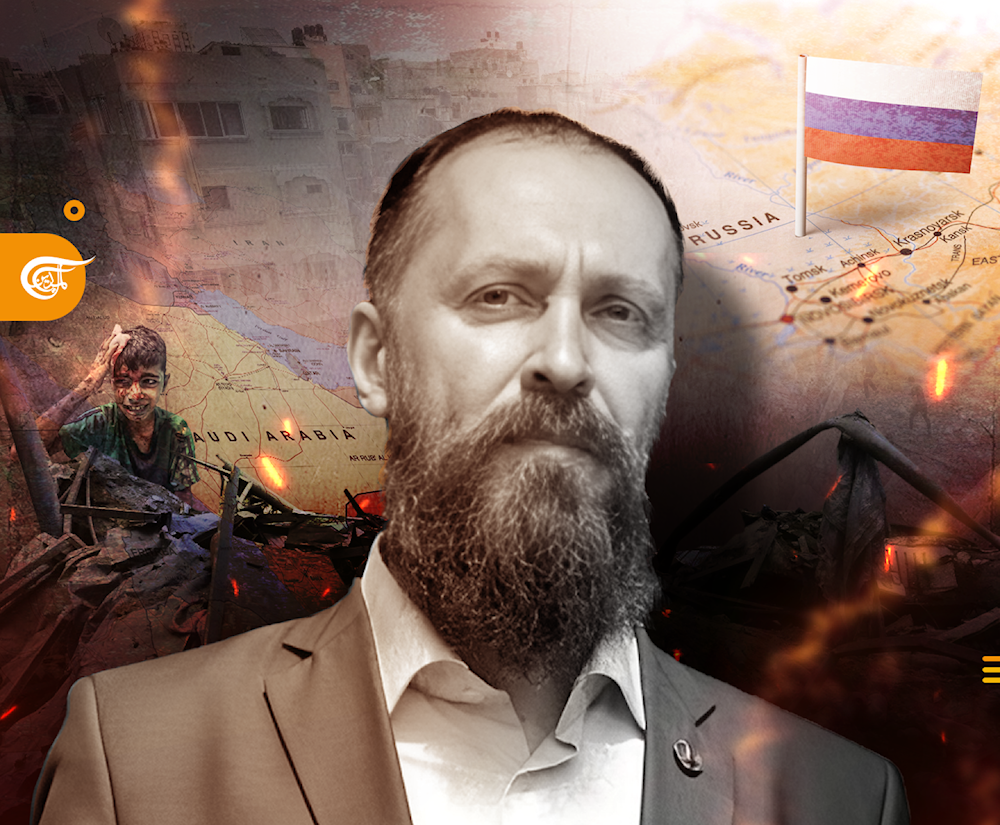Russian analyst: Strategic consequences to emerge from Gaza war
Russian geopolitical analyst and editor-in-chief of the Geopolitika website, Leonid Savin, draws on interlinked influences between Ukraine and Palestine vis-a-vis US foreign policy and global influence.
-

Geopolitika editor-in-chief and geopolitical analyst Leonid Savin speaks to Al Mayadeen Net and confirms that US global influence will strategic consequences as a result of the war on Gaza. (Al Mayadeen)
Russian geopolitical analyst and editor-in-chief of the Geopolitika website, Leonid Savin, said in an interview with Al Mayadeen Net that the official Russian position regarding the ongoing war in Palestine is to condemn the Israeli aggression and demand the establishment of a Palestinian state as stated in United Nations resolutions.
Savin stressed that within Russia, a clear understanding has been established of the existence of a humanitarian catastrophe as a result of the ongoing aggression against Palestine, confirming that Russia had already provided assistance for the Gaza Strip through Egypt.
Interlinked: Ukraine, Operation Al Aqsa Flood
Turning to events in occupied Palestine from an international relations perspective, Savin pointed out that the interests of the West and weapons supplies reveal interconnections in global politics, especially noting the ongoing war in Ukraine.
"Russia is conducting the special military operation in Ukraine against the neo-nazi regime (where Ukraine is being used as a proxy actor by Western powers)," he said, before stressing that "the fight for the freedom of the Palestinian people, as well the liberation of Ukraine by Russian forces, are both issues of justice."
According to the analyst, "The role of the US is purely destructive and provocative" which meant that "Washington is merely interested in keeping its own hegemony and control over West Asia," adding that "Israel" is Wahington's ally in "achieving this goal."
Significantly, he further underscored that "all attempts of the US and the West in general to achieve peace there have failed because of their lack of understanding of the complex reality of the region."
West attempted to redraw regional map
The West, according to Savin, even sought to control processes through schemes introduced by Bernard Lewis and Ralph Peters, which aimed to redraw the map of the region, however, "Now the world order has shifted from US-led unipolarity to multipolarity, and Washington is afraid and impulsive because of the current lack of trust in it, as many Arab countries are slowly withdrawing their support."
Speaking of the US sending the aircraft carrier USS Dwight D. Eisenhower to the eastern Mediterranean, joining the aircraft carrier it sent to the region earlier at the start of the Israeli aggression on the Gaza Stripin order to bolster its presence in support of the Israeli occupation, Savin said that "it was a signal to Hezbollah not to interfere in this conflict, and also a message to Iran and all parties that reject the Zionist entity."
In itself, said Savin, this approach highlights the "double standards" of the US as "it continues its military support for Israel, which has killed thousands of innocent Palestinians, while at the same time, the US is also impotent because its diplomatic tools have failed to resolve this conflict."
Palestinian Resistance did the impossible
Commenting on Operation Al-Aqsa Flood, the Russian analyst stated that "Hamas did an impossible thing when it attacked Israeli posts and military bases," especially noting, "After its defeat by Hezbollah in 2006, the Israeli army received good combat experience fighting a small yet highly motivated actor."
Savin also observed the "precise strikes" targeting "the US bases in Syria and Iraq," while "deterrence from South Lebanon" proved successful. However, "this war is not yet finished," he noted, and "it is too early to talk about results."
Notably, the geopolitical analyst confirmed that "in any case, the consequences for Israel and the US will be negative in the strategic sense."
Partially, the end of this war "depends on negotiations via Qatar and the US," according to Savin, but ultimately, he stressed, "Israel is interested in continuing its ethnic cleansing in Palestine, but it is difficult to do so openly," while on the other hand, "we do not have a complete grasp regarding the situation and Hamas' potential."
Read more: Russian UN envoy accuses West of hampering Gaza de-escalation

 4 Min Read
4 Min Read










